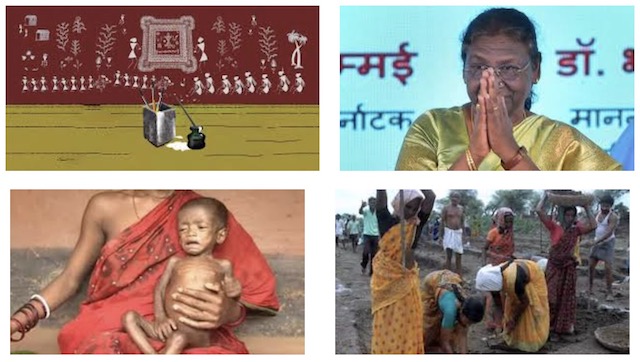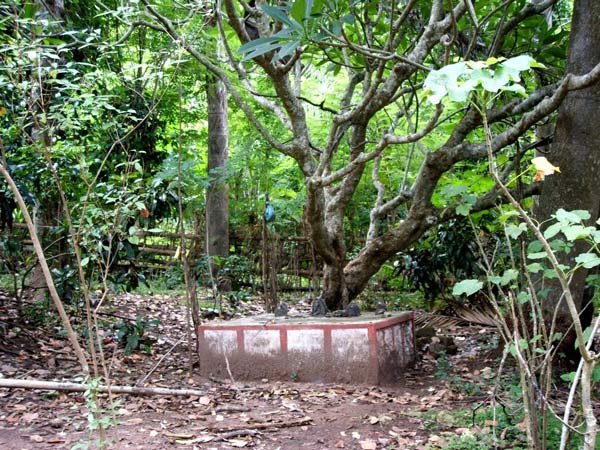In commissioning a High-Level Working Group headed by the space scientist K. Kasturirangan to study the recommendations of the Western Ghats Ecology Expert Panel (WGEEP), the Ministry of Environment and Forests hoped to resolve an impasse. It now appears that far from nearing resolution, the question of preserving and ensuring holistic development of the Ghats is enmeshed in more controversy. Read more >>
Source: “Hotspot in a spot” – The Hindu 30 April 2013
Address : http://www.thehindu.com/opinion/editorial/hotspot-in-a-spot/article4667395.ece
Date Visited: 11 March 2024

linked to each other.” – Droupadi Murmu | Speeches by the President of India >>
Images © publishers, artists & photographers featured by Google Safe Search
Learn more about water-related issues that affect India’s tribal communities >>
“Together, we must endeavour to strengthen tribal communities which are the role model in preservation of water, forest and land, and learn from their connection with nature and the surrounding environment for the sake of the entire human race.” – journalist and tribal rights activist Dayamani Barla in The Wire >>
An open letter from Madhav Gadgil says Kasturirangan panel report will rob the region of its biodiversity
Dear Dr. K. Kasturirangan,J.B.S. Haldane, the celebrated 19th-century scientist and humanist who quit England protesting its imperialistic invasion of Suez to become an Indian citizen, once said: “Reality is not only stranger than we suppose, but stranger than we CAN suppose!” I could never have imagined that you would be party to a report such as that of the High Level Working Group on Western Ghats, but, then, reality is indeed stranger than we can suppose!
In our report to the Ministry of Environment & Forests, based on extensive discussions and field visits, we had advocated a graded approach with a major role for grassroots-level inputs for safeguarding the ecologically sensitive Western Ghats. […]
It is vital to think of maintenance of habitat continuity, and of an ecologically and socially friendly matrix to ensure long-term conservation of biodiversity-rich areas, and this is what we had proposed.
Moreover, freshwater biodiversity is far more threatened than forest biodiversity and lies largely in what you term cultural landscapes. Freshwater biodiversity is also vital to livelihoods and nutrition of large sections of our people. […]
India’s cultural landscape harbours many valuable elements of biodiversity. Fully 75 per cent of the population of lion-tailed macaque, a monkey species confined to the Western Ghats, thrives in the cultural landscape of tea gardens. […]
It is our people, rooted in India’s strong cultural traditions of respect for nature, who have venerated and protected the sacred groves, the Ficus trees, the monkeys and the peafowl.
Apparently, all this is to be snuffed out. It reminds me of Francis Buchanan, an avowed agent of British imperialism, who wrote in 1801 that India’s sacred groves were merely a contrivance to prevent the East India Company from claiming its rightful property. […]
– Madhav Gadgil, Chairman, Western Ghats Ecology Expert Panel
Source: Shocking betrayal on Western Ghats – The Hindu
Address : http://www.thehindu.com/opinion/op-ed/shocking-betrayal-on-western-ghats/article4724986.ece
Date Visited: Sun May 19 2013 14:28:08 GMT+0200 (CEST)

Learn more about the Kaani community >>
United Nations on climate change >>
Up-to-date reports by Indian experts and journalists
Search tips
Combine the name of any particular state, language or region with that of any tribal (Adivasi) community.
Add keywords of special interest (music, poetry, dance just as health, sacred grove and biodiversity); learn about the rights of Scheduled Tribes such as the “Forest Rights Act” (FRA); and the United Nations “Declaration on the Rights of Indigenous Peoples”, “Universal Declaration of Human Rights”, “women’s rights”, or “children’s right to education”.
Ask a question that includes “tribal” or “Adivasi”, for instance: “Adivasi way of life better?” (or “tribal way of life worse?”)
Specify any particular issue or news item (biodiversity, bonded labour and human trafficking, climate change, ecology, economic development, ethnobotany, ethnomedicine, global warming, hunter-gatherers in a particular region or state, prevention of rural poverty, water access).
For official figures include “scheduled tribe ST” along with a union state or region: e.g. “Chhattisgarh ST community”, “Himalayan tribe”, “Scheduled tribe Tamil Nadu census”, “ST Kerala census”, “Particularly Vulnerable Tribal Group Jharkhand”, “PVTG Rajasthan”, “Adivasi ST Kerala”, “Adibasi ST West Bengal” etc.
In case the Google Custom Search window is not displayed here try the following: (1) toggle between “Reader” and regular viewing; (2) in your browser’s Security settings select “Enable JavaScript” | More tips >>
Note: hyperlinks and quotes are meant for fact-checking and information purposes only | Disclaimer >>
List of websites covered by this Google custom search engine
Academia.edu (platform for academics to share research papers) – www.academia.edu
Archive.org – https://archive.org
Centre for Science and Environment – https://www.cseindia.org
Current Conservation – https://www.currentconservation.org
Development and Cooperation (D+C) https://www.dandc.eu
Down To Earth (India) – www.downtoearth.org.in
India Environment Portal – www.indiaenvironmentportal.org.in
Harnessing Nature Magazine – https://harnessingnature.online
Kalpavriksh Environmental Action Group – https://kalpavriksh.org
Mongabay-India – https://india.mongabay.com
M S Swaminathan Research Foundation – www.mssrf.org
Navdanya (protecting India’s biodiversity based food heritage) – https://navdanya.org
Third World Network (Penang, Malaysia) – https://twn.my
The Shola Trust (nature conservation in the Nilgiri region) – www.thesholatrust.org
WorldCat (“the world’s largest library catalog, helping you find library materials online”) – https://worldcat.org
Research the above issues with the help of Shodhganga: A reservoir of theses from universities all over India, made available under Open Access >>
Note: hyperlinks and quotes are meant for fact-checking and information purposes only | Disclaimer >>
Find publications by reputed authors (add “open access” for freely downloadable content)
Learn more
Atree.org | Ashoka Trust for Research in Ecology & the Environment (posts)
Biodiversity | Biodiversity hotspot | Hyderabad biodiversity pledge
Climate change | Audio | The Climate Question (BBC Podcast)
eBook | Background guide for education
Ecology and environment | Eco tourism | Tourism | Wildlife tourism
Environmental history and what makes for a civilization – Romila Thapar
Equations blog (Equitable Tourism Options)
Forest Rights Act (FRA) | Hunter-gatherers | Illegal mining | Legal rights over forest land
Information provided by Indian government agencies and other organizations (FAQ)
Nature and wildlife | Crocodile | Elephant | Tiger | Mangrove forest | Trees
PARI’s tales from tiger territory | People’s Archive of Rural India (PARI)
Shola Trust | Nilgiri Biosphere
Water and development – India’s tribal communities
Western Ghats – tribal heritage & ecology
What is the Forest Rights Act about?
Who is a forest dweller under this law, and who gets rights?